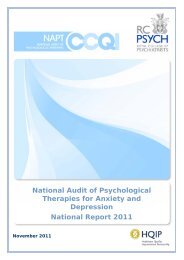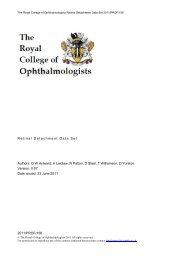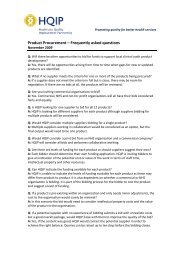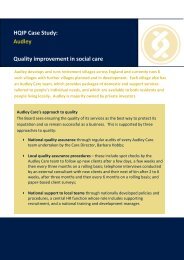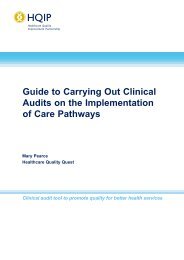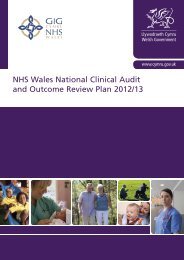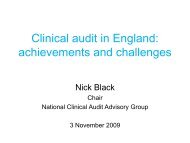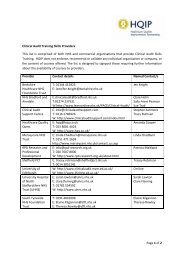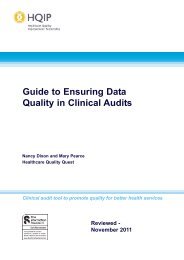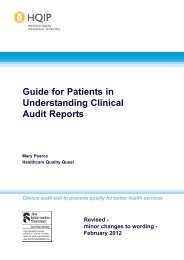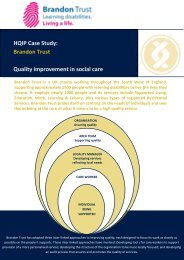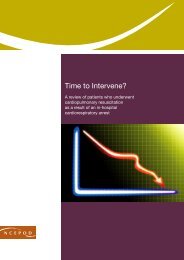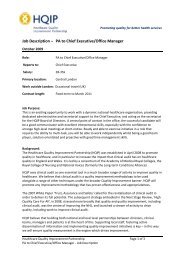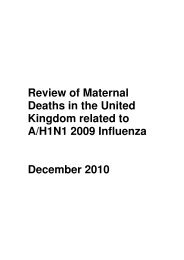Myocardial Ischaemia National Audit Project - University College ...
Myocardial Ischaemia National Audit Project - University College ...
Myocardial Ischaemia National Audit Project - University College ...
You also want an ePaper? Increase the reach of your titles
YUMPU automatically turns print PDFs into web optimized ePapers that Google loves.
The British Heart Foundation is a registered charity in England and Wales (225971) and in Scotland (SC039426)The project started when thrombolysis was the first linetreatment for STEMI patients in South West Wales. However,this approach to accessing reperfusion is just as applicable toprimary PCI where patients are conveyed straight to the tertiarycentre. Both treatment options have better outcomes the earlierthe intervention; reducing access delays are important.The resources developed include (Figure 23):Posters for public places, depicting signs and symptoms ofacute chest pain and what to doConcertina leaflets with a similar message, for use inrehabilitation / chronic disease management clinics, or anypublic eventA flow chart providing a systematic approach for nonclinicalstaff to signpost those complaining of acute chestpain to the 999 system (both presenting over the telephonerequesting a GP appointment or in person presenting to theGP surgery)A flow chart providing a systematic approach for clinicalstaff, who may not regularly deal with acute chest painpresentations, to enable a systematic approach.These resources can be downloaded from the South WalesCardiac Network website along with a generic PowerPointpresentation that can be adapted to suit local use.For further information please contact either Alison Turneralison.turner@wales.nhs.uk or Marc Thomas marc.thomas@wales.nhs.ukThe South Wales Cardiac Network project team would like tothank the following for their support:British Heart FoundationWelsh Ambulance Service TrustNorth East England Cardiovascular NetworkFigure 23. Posters, leaflets and flowcharts to raise awarenessof the need to respond to chest pain by dialling 999heart attack?know these symptomsless common symptomsIt is important to know that women are morelikely to have these less common symptoms.However, they may also experience the moretypical symptomsheart attacks...the facts– every year approximately 90,000 people diefrom heart attacks - that’s around 245 per day– around a third of heart attack patients diebefore reaching hospital– you are three times more likely to survive aheart attack if you call the emergency servicesimmediately and receive medical help in thefirst hour than if you waitheart attack?know these symptomsturn doubt into actionand call 999– a dull pain, ache or heavy feeling in the chest– a mild discomfort in the chest that makesAlthough the most common symptoms of a heart attackyou feel generally unwellare widely known, they vary from person to person.– a pain like indigestion which may spread However, not everyone having a heart attack has theseto the lower back and stomachtypical symptoms. Some people may only get one of thesesymptoms; some people may even get no symptoms at all.– feeling light-headed and dizzy, as well ashaving chest pain– jaw and neck ache, as well as having chest pain– aching in your jaw, neck or shoulders, usuallyas well as having chest pain.think quick... act fastturn doubt into actionand call 999.When someone has a heart attack it is vitalthat they act really quickly.Calling 999 immediately for an ambulance means you canget emergency treatment as soon as possible. This couldinclude clotbusting drugs – to restore the blood supplyto the heart – which should be given within minutesafter symptoms start.– central chest pain or tightness, which doesn’tMany people delay calling for an ambulance becausego away. This is often described as crushing orthey don’t recognise the symptoms... or because theyconstricting or like a tight band. The pain maydon’t believe that a heart attack may be happening.spread to the left arm, right arm, shoulders or jawIt is vital that people recognise the symptoms of a heart – feeling sick or being sickattack and take the right action quickly. If you suspect– shortness of breaththat you or someone else is having a heart attack youmust call 999 immediately.– sweating, although the skin may feel coldto the touch– reduced level of consciousness; or unconsciousness.don’t forget, doubt kills.so turn doubt into action –it could save your heartand your life.common symptomspain or discomfort in thechest that doesn’t go awayor may spread to neckand jawthink quick… act fastcall 999 immediatelythe pain may spread to theleft or right armyou may feel sick orshort of breathBHF_Symptoms Posters WALES_AW.indd 1 26/1/09 11:54:05The British Heart Foundation is a registered charity in England and Wales (225971) and in Scotland (SC039426)HistoryPatient complainsof acute chest painFurther HistoryCall emergencyservices andupgrade call to 999ExaminationDiagnosisof acutecoronary eventAcute Chest PainPatient ManagementAcute Chest Pain Management(Clinical) Patient complains of chest pain ordiscomfort and/or has collapsedPatient maycomplain of associatedsymptoms** AssociatedSymptoms• Shortness of breath• Nausea/vomiting• Sweating• Feeling light-headed• PallorTelephoneAsk Patient:Somebody is withIf patient is alone* Risk Factors the patient• Character/severity/location/radiation of pain• Smoking• Time of onset• Hyperlipidaemia• Is pain continuous?• Hypertension• Factors relieving pain• Diabetes• Past history of similar pain• Existing CHD• Risk Factors* • Ask for brief details • Family history of CHD• Related to activity (name, or exercise DOB, address) • Recent • cocaine Ask use for brief details• Is pain related to • trauma/injury? Note date/timeof patient (name, DOB,• Transfer the call toaddress)a doctor or nurse• Ask caller to redial 999Examination immediately• General appearance - pallor/clammy/cyanosedExamination• Vital signs – Pulse/BP/should not delayResp. rate/O2 Saturation/JVPtransport of patient• Auscultate chest•Dial 999 and ask to secondary careAbdominal examination – forsuspected aneurysm for ambulance forInform doctor• ECGchest pain to attendof the callat patient’s addressIn practiceCall 999 then alertdoctor or nurseImmediately• Sit patient down• Reassure help ison the way• Stay with patientuntil help arrivesEmergencyTreatmentSupport Equipment(where available):• Aspirin 300mgRemember:• Oxygen• Defibrillator• GTN sprayFor every minute • delay Oxygen in thrombolytic treatment 11 days survival is lost• Opiate analgesia/antiemetic• Suction• If not already called, call ambulance.• Airway• Bag Valve MaskThe British Heart Foundation’s Chest Pain Programmeaims to raise awareness of the symptoms Concertina_leaflet_WALES_AW.indd of a heart1 26/1/09 11:52:44attack and what action to take when someone thinksthey are having one. For information on the ChestPain Programme, email chestpain@bhf.org.ukRemember:For every minute delay in thrombolytic treatment 11 days survival is lostRegistered Charity Number 225971Registered Charity Number 225971Concertina_leaflet_WALES_AW.indd 2 26/1/09 11:52:47MINAP Eleventh Public Report 201287



